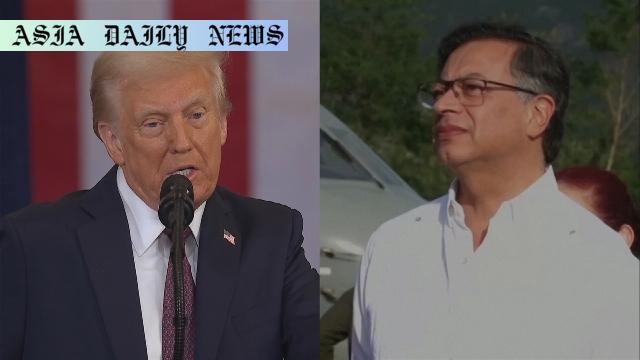Tariffs: Colombia agrees to US deportation terms after a tariff dispute escalates; tensions ease as trade penalties placed on hold.
Tariffs on Colombian goods were placed on hold after an agreement was reached.
Colombia agreed to unrestricted acceptance of deported undocumented immigrants.
Trade penalties were avoided following high-level negotiations between the two nations.
Colombia committed to assisting with deportation logistics using its resources.

The Dispute Over Deportations
On Sunday, U.S.-Colombia relations faced a dramatic escalation when Colombia refused to accept two U.S. military planes carrying deported undocumented immigrants. The Trump administration responded swiftly, announcing a hefty 25% tariff on Colombian imports and imposing financial sanctions. This created an immediate trade dispute that threatened to spiral into broader economic tensions.
How the Crisis Affected Trade
The tariffs announced by President Donald Trump were an aggressive move in response to Colombia’s refusal. Such a decision could have significantly impacted Colombia, as its economy is closely tied to the export of goods to the U.S. Among potential impacts were disruptions in industries such as coffee, flowers, and textiles, which rely heavily on American markets. The Colombian government, initially defiant, began searching for a resolution amid fear of major economic fallout.
The Agreement and its Significance
After urgent negotiations, Colombia agreed to U.S. terms, enabling the unrestricted return of undocumented immigrants from the United States. This arrangement effectively aligns with President Trump’s immigration policies. The agreement outlined that Colombia would accept deported citizens swiftly and provide its presidential plane to support deportation logistics. Such cooperation underscores the leverage trade dependence gives the United States in diplomatic negotiations.
The Impact on Bilateral Relations
While the agreement diffused the immediate crisis, the situation exemplifies the fragile nature of U.S.-Colombian relations. Colombia’s willingness to compromise demonstrates its financial obligation to maintaining amicable trade relations but may also highlight its vulnerability to strong U.S. policies. In an era where protectionism and immigration policy dominate U.S. strategies, smaller nations like Colombia must balance sovereignty and economic survival.
Global Implications
Trade wars and tariffs remain powerful tools in contemporary geopolitics. This incident sends a signal to other nations that the Trump administration will use economic measures to enforce immigration and other policies. It serves as a clear warning, especially to nations that rely on the U.S. as a major trading partner, to align their policies with American priorities or face economic consequences.
Colombia’s Perspective
Colombian officials, though successful in evading tariffs, now face the challenge of managing the political fallout back home. Critics claim that the agreement erodes national dignity and concessions were made too hastily to avoid financial losses. The debate reflects broader discussions about the cost of maintaining strong ties with the U.S., both in economic and policy terms.
The Role of Diplomacy Amid Economic Pressure
This incident underscores how diplomacy is increasingly being conducted with an economic undertone. The quick pivot from conflict to resolution demonstrates that nations must engage in skilled negotiations when dealing with large powers like the United States. It also shows how economic might can be harnessed for policy enforcement.
Conclusion
The recent crisis between the United States and Colombia serves as a poignant reminder that the economic and political arenas are tightly intertwined. For Colombia, the agreement may secure short-term economic stability, but it also raises questions about the long-term impact on its autonomy. For the United States, this outcome is a win for its immigration policy, achieved through sheer economic influence.



Commentary
Economic Power as Negotiation Leverage
The United States’ decision to use tariffs as a bargaining tool reveals the immense leverage available to economically powerful nations in diplomatic negotiations. As seen in this incident, Colombia had little choice but to yield under the pressure of impending economic penalties. This raises important questions about the fairness of such tactics, particularly when smaller, economically-dependent nations are involved.
The Broader Context of Immigration Policies
The Trump administration’s insistence on deportation policies reflects its broader agenda to enforce strict immigration laws. By extending its domestic policies into bilateral agreements, the U.S. creates significant ripple effects in the international sphere. Many nations find themselves walking the tightrope between maintaining trade relations with the U.S. and addressing internal dissent over aligning with America’s immigration agenda.
The Implications of Tariff Diplomacy
What is most striking about this episode is its immediacy. Within a matter of days, threats escalated to sanctions, only to return to a tentative peace following a compromise. This rapid escalation and de-escalation reveal the fragility of modern diplomatic ties, where economic tools can both strain and restore relationships. However, the specter of these reserved tariffs likely hangs over future dealings between the two nations.
Concluding Thoughts
Ultimately, the U.S.-Colombian agreement highlights both the power and peril of tying economic tools to political aims. While the immediate crisis may be resolved, this episode invites deeper contemplation on the ethical and practical implications of wielding tariffs to achieve non-economic objectives, particularly in a world where interdependence is unavoidable.